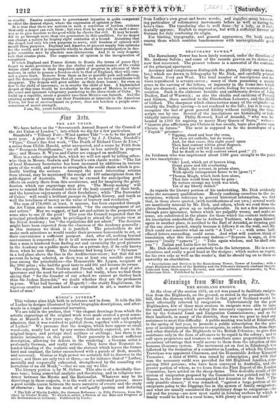BEAUCHAMP TOWER:*
The Beauchamp Tower has been lately restored, under' tb& direction of Mr. Anthony Salvin ; and some of the records graven on its stones are now first recovered. The present volume is a memorial of the contents of the principal apartment. Accuracy and completeness distinguish the plates, (thirty-one in num- ber,) which are drawn in lithography by Mr. Dick, and carefully printed by Messrs. Ford and West. The total number of inscriptions and de- vices reproduced is seventy-seven ; many of them possessing a quaint grace in the carving of the letters, or ingenuity in the forms into which they are disposed; some evincing real artistic feeling for monumental de- coration. Such is the elaborate heraldic and emblematic device of John Dudley, Earl of Warwick ; as also the shields and emblems of Peverel and Salmon, those ascribed to the Elizabethan Leicester' and the shield' of Gifford. The sharpness which characterizes many of the originals—as notably the Dudley carving—is not rendered to the full ; but it is easy to recognize the fact of great general fidelity without verifying the tran- scripts one by one. Several of the inscriptions are historically or indi- vidually interesting. Philip Howard, Earl of Arundel, "who was be- headed in 1595 for aspiring to marry Mary Queen of Scots," writes- " Quanto plus affiictionis pro Christ° in hoc &caul!), tenth plus &brim cum Christ° in future." The next is supposed to be the monologue of a "Popish" prisoner-
" Tipping, stand and bear thy cross, For thou art catholic, but no worse ; And, for that cause, this eight years' space Thou hast content within great disgrace. Yet what hap will hit I cannot tell, But be death er be well content sweet good." (?) An Irishman who was imprisoned about 1580 goes straight to the point in two inscriptions- " Oh ! Lord, which art of heaven king, Grant grace and life everlasting To Miagh, thy servant, in prison alone, With speedy enlargement hence to be [gone ?] " "Thomas Miagh, which lieth here alone, That fain would from hence be gone : By torture strange my truth was tried, Yet of my liberty denied."
As regards the literary portion of his undertaking, Mr. Dick evidently lacks the necessary qualifications. Merely confining ourselves to the in- scriptions, without reference to general historical information, we find that, in those above quoted, (with rectifications of our own,) several words are manifestly misread by Mr. Dick, and others, which we read from the plates themselves, given up as indecipherable. In not a few instance; through pure ignorance, letters which are palpably wrong; and make no sense, are substituted in the plates for those which the context indicates. An inscription undoubtedly due to Anthony Tuchiner, who signs himself again in another place, is ascribed to the Earl of Arundel, as forming part of the one above quoted, simply because it follows it on the wall, end Mr. Dick could not conceive what on earth "A Tuch" - - - with eorao half- effaced letters succeeding, could mean. And what will readers think of translation after this free-and-easy fashion—" Reprems le sage,,,et ii to aumera" [really " aymera : "Take again wisdom, and he shall arm you " ? Italian and Latin fare no better.
Mr. Dick should have got somebody to do the letterpress. He is a con- scientious and really a good hand at the designs ; which makes us regret, for his own sake as well as the reader's, that he should tag on to them so unworthy an elucidation.
• Inscriptions and Devices in the Beauchamp Tower, Tower of London ; with a short Historical Sketch of the Building and the Prisoners formerly confined therein. Collected from State-papers. Records, and other authentic Documents, by Wm. Robertson Dick. Published by Low.


































 Previous page
Previous page